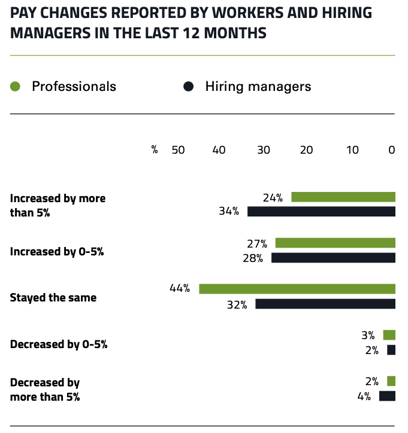
By
Ryan Carroll
March 4, 2024
Updated
January 17, 2025
Exploring AI's impact in the renewable sector: Insights from the 2024 GETI Report
Since its inception in 2017, the Global Energy Talent Index (GETI) Report has shared insights from thousands of professionals to create a comprehensive map of the energy landscape. Providing companies with the knowledge to innovate their skill sets and secure top talent.
This year’s GETI report looks into the rise of artificial intelligence (AI) and how it’s reshaping everything in the energy industry, from job roles to skills in demand.
This article covers how the renewable energy sector is approaching AI adoption and focuses on trends related to salaries, global mobility, and skills demand across the sector.
Here is a breakdown of the sections covered in this article:
- The energy transition has led to salary increases
- Overseas job offers are increasing for renewables talent
- Renewables talent in high demand across the energy industry
- The renewables sector is embracing AI more than any other
- Download the GETI report
The clean energy transition has led to salary increases for the renewables sector
Renewables sector salaries are rising amidst the clean energy transition. 51% of professionals reported a pay rise over the last year (compared to 47% in the previous year). Of those employees, 24% received a salary increase of 5% or more, compared to 20% last year. Pay raises have been even higher among engineers, with 54% reporting a raise.
The outlook is brighter still for hiring managers, 62% of whom reported a pay rise, with 34% receiving one above 5%.
Workers in the renewables industry are optimistic about their salaries, with 73% expecting a pay rise over the next year.
These increases in pay could in part be due to increasing inflation and high interest rates. However, there is also something to be said about the growing green skills gap, which has increased competition for talent in the renewable energy sector, thus leading to a rise in salary offerings.
Overseas job offers are increasing for renewables professionals
Global mobility is also on the rise for the renewables sector. With international decarbonisation increasing, the number of companies providing overseas job transfers has grown from 52 to 58% since 2022.
Now, more than 90 countries have net zero targets, opening up various opportunities for international relocation. The competition for global mobility is ramping up due to rival green policy incentives, which appeal to a more environmentally-conscious workforce.
Europe is the top destination for relocation, with 34% of professionals saying they would move there for work, followed by North America (19%). This is likely due to intensifying transatlantic competition in clean energy, from the EU Green Deal to the US Inflation Reduction Act.
Although the gap between the two countries as a relocation option seems fairly wide, it has narrowed by 5% since last year.
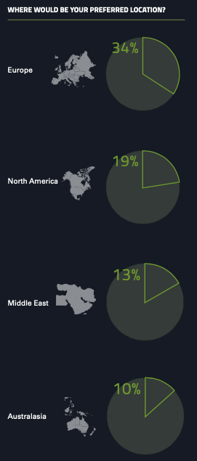
When it comes to why renewables professionals are so willing to relocate, career progression has fallen slightly since last year (53% vs 58%), whereas there has been an 11% increase in workers wanting to relocate for reasons related to lifestyle and the cost of living. The third biggest motivator is better access to innovative tools and working methods, such as AI.
Renewables talent in high demand across the energy industry
Competition for talent in the renewables sector is intensifying, with 32% of current employees being headhunted six or more times over the last year. 13% of GETI respondents reported receiving more than 16 approaches last year, and a quarter said that more than half of these approaches came from an outside industry.
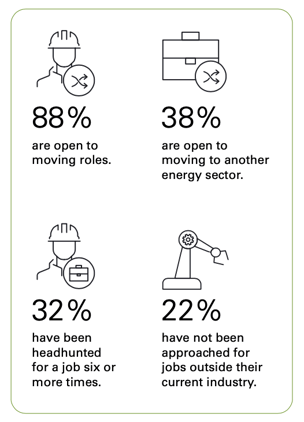
What’s interesting is that this interest from recruiters is reciprocated by renewables professionals; 88% of respondents said they would consider switching jobs, citing the top reasons as career progress and interest in the wider industry. 38% said they would move to another sector within the green energy sector, with power topping the list (43%), followed by oil and gas (42%). Technology has also seen a surge in interest since last year’s GETI report, with 29% of respondents considering a switch to that sector.
In order to retain their talented workforce, renewables firms must continue to foster a culture of innovation, sustainability and professional development.
Renewables is embracing AI more than any other sector
Companies across the energy industry are increasingly adopting AI, but renewables has emerged as the most technologically progressive sector as the highest proportion of GETI respondents (32%) said they use AI in their role.
Though the proportion of energy companies with an AI policy is closely matched to the proportion of people using it, 28% of those with a policy reported not having read it. Furthermore, 15% of all respondents are uncertain about whether their workplace has a policy in place, which indicates a greater need for employee awareness around company documentation.
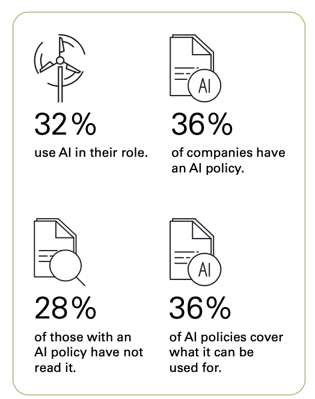
When it comes to the topics included in AI policies, the following are the most covered:
- Benefits and/or objectives of using AI use (63%)
- Maintaining data protection, integrity and security (54%)
- Training requirements (44%)
When we consider that the top three perceived risks from AI include cyber security and ‘poor training leading to misuse or poor adoption’, this suggests that problems with the training process could expose organisations to breaches. It’s important to remember that AI adoption is still in its infancy, but is quickly accelerating. It’s encouraging that AI policies are increasing among renewables firms, but employee training programs need to be factored into the practice.
Uses of AI for the renewables sector
For the renewables sector, the most used AI applications are generative models such as ChatGPT, Bard AI and Claude, followed by machine learning. Firms also use Artificial General Intelligence, and there have been instances of technologies such as Unmanned Autonomous Vehicles being adopted for remote inspection.
28% of renewables professionals said that they use AI to optimise energy production, whereas 22% said their main use for applications is to improve products and services.
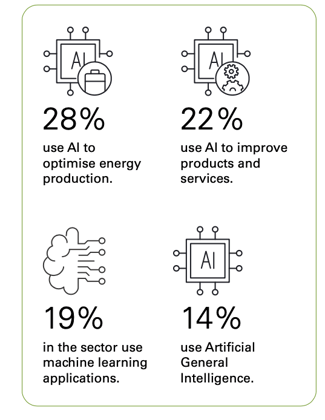
AI is potentially a game-changer for improving the success of renewable energy projects, so it is unsurprising that the sector is the biggest adopter of AI within the entire energy industry.
However, AI doesn’t come without challenges, and renewables workers know this. Findings from the GETI report indicate that employee resistance to AI adoption lies within worries about insufficient investment in AI applications and employee support. Companies have the ability to overcome these concerns by introducing more comprehensive information, as respondents highlight a lack of clarity over which tools offer the best fit for the company as one of the biggest challenges.
Despite the challenges, 87% are optimistic about the future impact of AI in the workplace. 78% of individuals working in renewables feel that AI will lead to an increase in productivity over the next two years, and 62% believe that AI could create career progression opportunities and raise job satisfaction. Alongside this, 45% hope that AI will increase the time spent on strategic tasks or using soft skills for creativity and problem-solving, while AI tackles the more manual tasks.
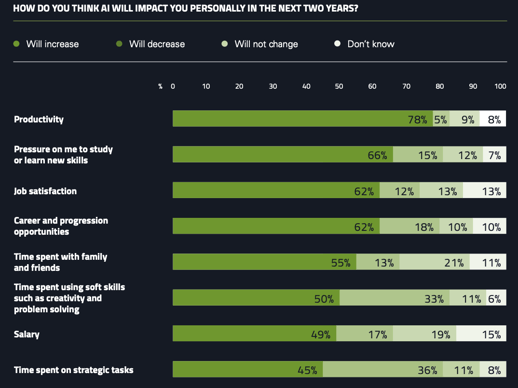
Renewables professionals also feel optimistic about AI’s ability to improve research and development and optimise productions, services and solutions.
This is, however, clouded by concerns about the lack of human touch, insufficient training and cybersecurity risks. This again highlights the importance of careful communication and training regarding AI adoption in the workplace.
Skills in demand
Although the popular perception is that AI automation will replace human jobs, 96% of those surveyed believe that AI will in fact increase the need for human skills.
Topping the list of skills in demand are technical skills such as programming and software engineering (both 27%), followed by machine learning (26%). 24% of respondents anticipate a higher demand for cybersecurity skills, and 23% predict there will be a stronger need for robotics skills.
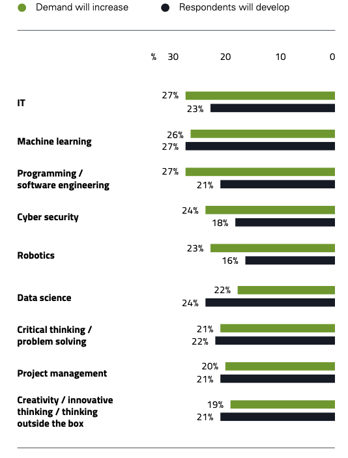
However, few renewables employees feel inspired to develop these skills, which suggests a potential skills gap in cybersecurity and robotics.
The GETI report also found that soft skills will be more desirable as automation increases the value of human work. Amongst the most sought-after soft skills are critical thinking and problem solving, leadership and people management, and creativity or innovative thinking.
As renewable energy companies continue to adopt AI into their processes, employees are also being influenced to develop the most in-demand skills, from machine learning to data science and IT. More than a quarter of engineers reported that they are considering developing programming/software engineering skills in the wake of AI adoption.
Download the full GETI report
Would you like to learn more about the trends expected to shape the renewable energy industry in 2024? Get all the latest insights and information on trends across the rest of the energy industry in the 2024 GETI report. Download it today.
